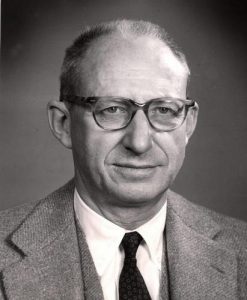Lee A. McCardell worked for the Baltimore Sun for nearly 40 years. Below is a biography of his life. Inducted into MDDC’s Hall of Fame in 2015.

To untold thousands Lee McCardell is best remembered as a Baltimore Sun war correspondent during World War II, a correspondent who not only wrote of battles but told of the men who prepared for and fought in them — and won their respect and the gratitude of those they had left at home.
Late in the war a British Broadcasting Corporation correspondent accredited to the American 3d Army wrote in a letter:
“Lee McCardell is terrific—first into Metz, first into St. Avold, first into Saarlautern, and one learns (but not from him) that he was the first into Paris and the only reporter to get into Fort Driant; and all in the most self-effacing way, inquiring quietly after Marylanders and appearing not to notice the war.”
Lee McCardell was born in Frederick June 8, 1901, of a family whose forebears on the paternal side had been Frederick county farmers, bankers, business men and public officials since the days of the pioneers.
Receiving his early education in the public schools of Frederick, he enrolled in the Carnegie Institute of Technology, at Pittsburgh, for a course in engineering.
But he stood it for less than a year.
“He despised mathematics,” a classmate said. “He wanted to write.”
So Mr. McCardell switched to the University of Virginia and a liberal arts curriculum, picking subjects that would train him for a writing career.
Upon completion of studies he came to Baltimore and a job on the old News. For about a year he was a district reporter, covering casus belli on the police front.
In 1925 he transferred to The Evening Sun. He spent the rest of his career with the Sunpapers except for a year’s sabbatical in the 1920s, when he toured Europe, had a fling on the New York Evening Post was a staff member for a time on the Paris edition of the New York Herald.
He quickly established himself on The Evening Sun as a top reporter and feature writer.
He was known as a “clean” writer – a newspaperman who had the light, deft touch when it was needed, a straightforward clear style that marks the professional.
In 1933, Mr. McCardell received the first of many awards he was to win for his work as a newspaperman. He covered the rout of the Bonus Army, out-of-work World War I veterans who had settled in shacks along the Anacostia River in Washington, and his account of that incident won an honorable mention in the Pulitzer Prize competition.
In the years just before World War II Mr. McCardell sensed what was about to break.
To prepare himself, for it he went into the field, covering pre-war maneuvers of the United States Army. After a post-Pearl Harbor trip to the West Coast to describe the evacuation of Japanese-ancestry residents there, Mr. McCardell was accredited to the 29th Division, composed of former National Guardsmen from Maryland, Virginia and Pennsylvania.
From then until the Nazis gave up he wore the uniform of a war correspondent.
Remaining for some time with the 29th Division during its pre-invasion training in England, Mr. McCardell was later detached to cover part of the Allied campaign in Italy.
Still later in the war he was attached to the 9th Air Force as a correspondent. He was one of the four reporters who described the D-Day landings from the air.
After a brief postwar period of getting used to civilian life once again, Mr. McCardell became chief of the London Bureau of The Sun.
That eighteen-month tour of duty over, he was appointed city editor of The Evening Sun, a post he held until he was promoted June 21, 1954, to be assistant managing editor of that paper.
When The Sun opened its Rome Bureau in 1957, the natural choice for bureau chief was Lee McCardell. Mr. McCardell returned to the United States and The Evening Sun in 1960.
Reporter, foreign correspondent, feature writer, biographer – a man whose reportorial genius brought to vivid life such diverse events as a revolt in Algeria, a stormy night at a national political convention and the classroom day of a first grader — Mr. McCardell was assistant managing editor of The Evening Sun at the time of his death on February 7, 1963.
He was 61 years old.
